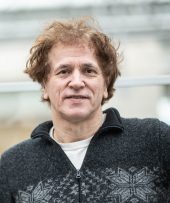Five LSI research groups have been awarded funding through the Canadian Institutes of Health Research (CIHR) Canadian 2019 Novel Coronavirus (COVID-19) Rapid Research competition.
Life Sciences Institute (LSI) Director Dr. Josef Penninger and Dr. Eric Jan, are lead applicants, and Drs. François Jean, Natalie Strynadka and Chris Overall are co-investigators on four separate grants announced in two rounds, on March 6 and March 22.
Most of the labs and facilities at the LSI are currently closed in keeping with COVID-19 policies in place at UBC, but our researchers, staff and trainees in the funded labs remain on site, working intensively at the forefront of Canada’s emergency efforts to accelerate the development, testing and implementation of medical countermeasures to mitigate the rapid spread of COVID-19 and its negative consequences on people and communities.
“Research is a vital component of the response to emerging disease outbreaks,” said Dr. Teresa Tam, Chief Public Health Officer of Canada, in a news release issued by the Government of Canada . “The research to be undertaken by the successful teams will help to answer some of our most pressing questions about COVID-19 and help to develop the tools we need to effectively respond to this global public health emergency.”
The Federal government has invested a total of $52.6M in 96 research teams across the country.

“Host cellular protein substrates of SARS-CoV-2 proteases,” the grant submitted by Dr. Eric Jan, will focus on identifying the host proteins that are targeted by a viral protein called a protease using an unbiased proteomics approach. Currently, the pathogenic mechanisms that lead to COVID-19 and related SARS/MERS-CoV diseases are not understood. Identifying the protein targets of SARS/MERS-CoV proteases will reveal insights into the protein sequence that binds to the proteases. The team lead by Dr. Jan will engineer and optimize decoy protein sequences that will effectively block SARS/MERS-CoV protease function and thus, inhibit SARS/MERS-CoV infection. Uncovering the proteins that are targeted by  the SARS/MERS-CoV proteases will also provide a catalog of the host processes that these viruses affect, thus gaining insights into the pathogenic mechanisms that lead to COVID-19 disease. Dr Chris Overall is a co-investigator on this grant.
the SARS/MERS-CoV proteases will also provide a catalog of the host processes that these viruses affect, thus gaining insights into the pathogenic mechanisms that lead to COVID-19 disease. Dr Chris Overall is a co-investigator on this grant.

“Preventing SARS-CoV-2 infection by targeting human type II transmembrane serine protease activity,” was submitted by an international, transdisciplinary team, including LSI PI Dr. François Jean (UBC) an expert in antiviral drug discovery and emerging human viruses; Dr. Richard Leduc (Université de Sherbrooke) an expert in the molecular pharmacology of proteases; Dr. Éric Marsault (Université de Sherbrooke) expert in medicinal chemistry; and Dr. Gary Whittaker (Cornell University), a world expert on coronavirus biology. The grant focuses on the development and evaluation of candidate therapeutics as part of the medical countermeasures research area. This project brings together the complementary expertise of renowned scientists.
Together, the team will catalyze collaborative North American research in COVID-19 candidate therapeutics, provide a unique interdisciplinary training program in anti-SARS-CoV-2 drug discovery at the interface of host-directed antivirals and human organoid infection models, to be developed in collaboration with Dr. Jean’s Canadian industry collaborator (STEMCELL Technologies) and expose trainees to a cross-disciplinary research environment in state-of-the-art CFI-funded settings, including UBC FINDER, one of the largest university-based containment level 3 facilities in the world.
 Dr. Jean and Dr. Strynadka are Co-Investigators on a second Rapid Response Grant, “Augmented Discovery of Potential Inhibitors of SARS-CoV-2 3CL Protease,” led by UBC researcher Dr. Artem Chersakov. Dr. Jean’s virology team will focus on the screening of candidate compounds identified by the Cherkasov team. The first screening performed in the Jean lab will be performed using their high-throughput screening assays developed during the SARS-CoV outbreak in Canada 15 years ago. The Jean team will then test the most potent molecules against the SARS-CoV-2 virus at the state-of-the-art Facility for Infectious Disease and Epidemic Research (FINDER) at UBC.
Dr. Jean and Dr. Strynadka are Co-Investigators on a second Rapid Response Grant, “Augmented Discovery of Potential Inhibitors of SARS-CoV-2 3CL Protease,” led by UBC researcher Dr. Artem Chersakov. Dr. Jean’s virology team will focus on the screening of candidate compounds identified by the Cherkasov team. The first screening performed in the Jean lab will be performed using their high-throughput screening assays developed during the SARS-CoV outbreak in Canada 15 years ago. The Jean team will then test the most potent molecules against the SARS-CoV-2 virus at the state-of-the-art Facility for Infectious Disease and Epidemic Research (FINDER) at UBC.
The Jean virology team is very excited to work on this project that builds upon previous successes with SARS and their discovery of the first generation of anti-SARS agents directed at the SARS-CoV 3CL protease from marine natural products (Biological Chemistry, 2006: Awarded Paper of the Year 2006). This work was done in collaboration with Dr. Raymond Andersen (UBC Chemistry).
The fourth successful grant, “Molecular and cellular therapies against COVID-19 using angiotensin-converting enzyme 2 (ACE2)” is based on breakthrough discoveries in the Penninger lab in the aftermath of the SARS virus. In 2005, Dr. Penninger along with researchers from the University of Toronto and Peking Medical Union College found that the ACE2 protein, a key receptor for the SARS virus, played a crucial role in SARS-coronavirus–induced lung injury (Nature Medicine, 2005), and that recombinant ACE2 (rhACE2) can protect from severe acute lung injury (Nature,2005). Since SARS-CoV-2 also uses ACE2 as a receptor to infect cells, this grant application aims to conduct a pilot trial of rhACE2 in patients with severe COVID-19 in China.
 In addition to the pilot clinical study, the team will conduct basic studies to examine the specific mechanisms of action of SARS-CoV-2 and ACE-2 dependency in engineered human organoids of lung, gut, blood vessels, and kidney. Another aim of the project is to test cells overexpressing the human ACE2 gene as precision cell therapy for protection against SARS-CoV-2 infection in an experimental model.
In addition to the pilot clinical study, the team will conduct basic studies to examine the specific mechanisms of action of SARS-CoV-2 and ACE-2 dependency in engineered human organoids of lung, gut, blood vessels, and kidney. Another aim of the project is to test cells overexpressing the human ACE2 gene as precision cell therapy for protection against SARS-CoV-2 infection in an experimental model.
This rapid response proposal brings together a truly international team of experts including Dr. Josef Penninger (UBC), a Canada 150 Chair in Functional Genetics; Dr. Haibo Zhang (St. Michael’s Hospital/SMH, Toronto) a clinician scientist with expertise in infection/immunity and cell therapy in sepsis and lung injury; Dr. Arthur Slutsky (SMH), a renowned expert in acute respiratory distress syndrome (ARDS), translational research, and clinical trials, and co-author with Dr. Penninger on his ACE2 discoveries in context of SARS; Dr. Ali Mirazimi (Karolinska Institute, Sweden), who leads a high biosafety level (P3/P4) research facility which is working with SARS-CoV-2; and Dr. Nanshan Zhong (China), the leading physician scientist who led the fight against SARS in China, and is the Chair of the National COVID-19 Commission in China. The rhACE2 drug (APN01) for the pilot clinical study is being provided by APEIRON Biologics AG, a biotechnology company based in Vienna, Austria, co-founded by Dr. Penninger.
For further details on the trial please click here
Photo credit: Tibor Kulcsar, IMBA
Related links:
